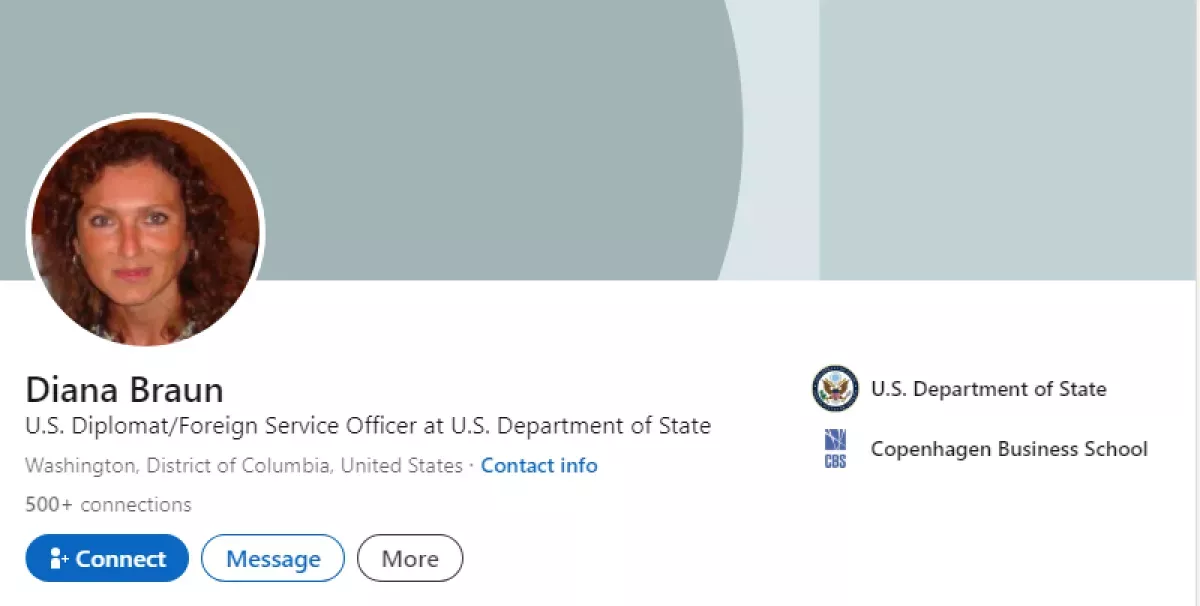Diana Braun and her "mission" in Baku: Time for the handler to leave Part II
On December 5, an investigative article by our writer Samir Veliyev was published on the Caliber.Az website, titled "Diana Braun and her 'mission' in Baku - The undercover curator." The article, based on reliable information from informed sources, exposes the darker side of the activities of Diana Braun, a U.S. embassy employee in Azerbaijan.
Officially, Diana Braun is responsible for the embassy's political affairs. However, the less visible aspect of her work involves overseeing Azerbaijan's opposition. Furthermore, as our sources revealed, with the help of activists and trusted contacts within Azerbaijan, Braun was gathering negative information about various officials in the host country.

Naturally, the publication of this article had the impact of a bombshell—not only in our society but also within the U.S. embassy itself. Soon after, the subject of our article, Diana Braun, called the Caliber.Az editorial office and, in an ultimatum tone, demanded that the article be removed from our website, threatening to take legal action if we did not comply. Well, we are not afraid of threats, and we do not succumb to pressure. As for the court, we are a rule-of-law state, and everyone has the right to appeal to the courts and act within the legal framework. We are confident in the accuracy of our information and are prepared to provide evidence of Diana Braun’s involvement in overseeing Azerbaijan's opposition. Therefore, there can be no question of us damaging anyone’s honour, dignity, or business reputation with our publication.
Realizing that Diana Braun’s attempt to pressure Caliber.Az had failed, the U.S. embassy's press secretary in Azerbaijan then contacted our editorial staff, trying to assure us that everything written in the article about Diana Braun was false. He also requested that we remove the material from the website. As one might expect, this request was politely but firmly denied.
You know what's interesting here? Anti-Azerbaijani content is regularly published in U.S. media, often with aggressive and unfounded criticism of the country’s government, questioning Azerbaijan's territorial integrity and sovereignty. How would the editor-in-chief of an American media outlet respond if, for example, an Azerbaijani embassy employee in the U.S. called and demanded the removal of such an article? At best, the editor would hang up the phone. At worst, another article would be published, this time about how "Azerbaijani diplomats are attempting to interfere with editorial work." Fortunately, after years of facing double standards in relation to our country, we’ve developed immunity to such defamatory materials.

By the way, let’s look at the situation from another angle. Americans often claim that freedom of speech and the press is one of the most important freedoms in the U.S., with the Founding Fathers enshrining it in the First Amendment to the Constitution, which was part of the Bill of Rights adopted in 1791. Now, imagine if an article or segment appeared in the American media that Diana Braun or a U.S. embassy representative in Azerbaijan didn’t like. Would they simply pick up the phone and demand or ask the editorial office to remove the article or segment? We’re confident the answer is no, because, in the U.S., that’s considered a taboo—a violation of freedom of speech. So why, then, did the U.S. embassy in Azerbaijan think it could just call up an Azerbaijani media outlet, interfere with editorial processes, and shamelessly violate the law, bypassing the conditions in the country that ensure freedom of speech and the free operation of the media? Ah, yes, in America, that’s not allowed—but in Azerbaijan, apparently, it is?
So, what can be said in conclusion? Caliber.Az will not remove the article about Diana Braun, and we have no intention of doing so. As for Mrs Braun herself, it’s possible she may be declared persona non grata for actions incompatible with her diplomatic role and in violation of the Vienna Convention on Diplomatic Relations. However, she still has the opportunity to save face and leave our beautiful country voluntarily, perhaps "for health reasons." As we mentioned in our previous article, it’s always better to leave voluntarily than to be expelled, with a resounding failure added to one’s record.








